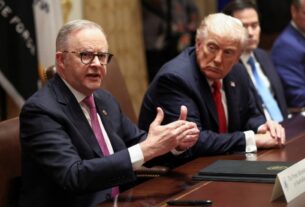WASHINGTON, Aug 26 — In a candid and somewhat cryptic exchange with reporters, former US President Donald Trump hinted that the United States holds powerful leverage over China in the ongoing dispute surrounding rare earth minerals — and he’s not afraid to use it, if necessary.
While meeting with South Korean President Lee Jae Myung in Washington, Trump shared that a visit to China could be on the horizon — possibly by the end of the year or shortly after. Despite recent tensions, he expressed optimism about the future of US-China relations.
“At some point, probably during this year or shortly thereafter, we’ll go to China,” Trump said. “We’re going to have a great relationship with China.”
But his comments didn’t stop there. With a confident tone, Trump emphasized the strategic strength of the United States:
“They have some cards. We have incredible cards, but I don’t want to play those cards. If I played those cards, that would destroy China.”
It’s the kind of statement that sends ripples through global markets — especially as both countries navigate a complicated trade relationship. Earlier this year, the US and China found themselves in a tit-for-tat tariff battle, severely disrupting supply chains and causing significant uncertainty among global importers. Tariffs on both sides soared into triple digits before a temporary truce was brokered.
That truce, however, remains delicate. While both nations have scaled back tariffs — with the US lowering to 30% and China to 10% — the situation is far from resolved. Trump made it clear that the US expects cooperation from China, particularly regarding the supply of rare earth magnets — critical components for everything from electric vehicles to defense technology.
“They have to give us magnets,” Trump warned. “If they don’t, then we have to charge them a 200 per cent tariff or something.”
Still, he sounded cautiously hopeful. “But we’re not going to have a problem, I don’t think, with that.”
Rare earth elements have been at the center of strategic global trade tensions, with China being the dominant supplier. The US, aiming to reduce dependency, is closely watching how Beijing fulfills its commitments.
For now, both sides have agreed to delay any return to higher tariffs for another 90 days — buying time until November 10 to see whether real progress can be made.





